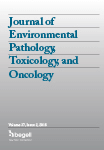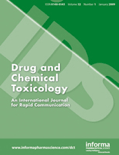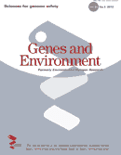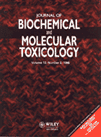
JOURNAL OF ENVIRONMENTAL PATHOLOGY TOXICOLOGY AND ONCOLOGY
Scope & Guideline
Decoding Environmental Risks to Enhance Public Health
Introduction
Aims and Scopes
- Cancer Pathogenesis and Mechanisms:
The journal emphasizes research on the molecular and cellular mechanisms underlying cancer development and progression, including the roles of non-coding RNAs, genetic mutations, and metabolic alterations. - Toxicology and Environmental Health:
Research published in the journal explores the toxicological effects of environmental agents, including heavy metals and pollutants, and their associations with cancer and other diseases. - Prognostic and Diagnostic Biomarkers:
The journal highlights studies that identify and validate biomarkers for cancer prognosis, diagnosis, and therapeutic response, contributing to personalized medicine approaches. - Therapeutic Interventions and Natural Compounds:
A significant focus is on the development and evaluation of novel therapeutic strategies, including the use of natural compounds and nanotechnology in cancer treatment. - Impact of Lifestyle and Environmental Factors:
The journal investigates how lifestyle choices and environmental exposures affect cancer risk and progression, providing insights into prevention and health promotion.
Trending and Emerging
- Long Non-Coding RNAs in Cancer:
Research on long non-coding RNAs (lncRNAs) has surged, emphasizing their roles in cancer prognosis, regulation of gene expression, and potential as therapeutic targets. - Microbiota and Cancer Interactions:
Emerging studies are increasingly exploring the role of gut microbiota and probiotics in cancer prevention and therapy, reflecting a broader interest in the microbiome's impact on health. - Immunotherapy and Immune Landscape Studies:
There is a growing trend toward understanding the immune microenvironment in various cancers, with studies focusing on immune-related genes and their prognostic implications. - Environmental Exposures and Cancer Risk:
Research examining the links between specific environmental exposures, such as heavy metals and pollutants, and cancer risk is trending, highlighting the importance of environmental health. - Systems Biology Approaches:
An increase in the use of systems biology and bioinformatics to analyze complex interactions in cancer biology and toxicology is evident, indicating a trend towards integrative and holistic research methodologies.
Declining or Waning
- Traditional Chemotherapy Approaches:
There has been a noticeable decline in studies focusing solely on traditional chemotherapy methods without exploring novel agents or combination therapies, indicating a shift towards more integrative and innovative treatment strategies. - Basic Epidemiological Studies:
The prevalence of basic epidemiological research focusing solely on cancer incidence and prevalence without molecular or mechanistic insights has decreased, suggesting a move towards more detailed mechanistic investigations. - Single-Agent Toxicology Studies:
Research focusing on the toxic effects of single environmental agents has dwindled, as there is a growing interest in understanding the interactions and cumulative effects of multiple exposures.
Similar Journals

Malaysian Journal of Pathology
Exploring the frontiers of disease mechanisms and diagnostics.Malaysian Journal of Pathology, published by the MALAYSIAN JOURNAL PATHOLOGY, stands as a pivotal resource in the fields of pathology and medicine, contributing rich insights since its inception in 1979. This peer-reviewed journal, based in Malaysia, is dedicated to disseminating original research, review articles, and case studies that advance the understanding of disease mechanisms and diagnostics. With a current impact factor reflecting its ranked positioning—Q4 in Cell Biology, Q4 in Histology, and Q3 in both Miscellaneous Medicine and Pathology & Forensic Medicine—this journal serves as an essential platform for researchers, clinicians, and students alike. Although it operates without open access, its scholarly rigor and contributions are well recognized, holding ranks such as #84 in Pathology and Forensic Medicine according to Scopus. The Malaysian Journal of Pathology is committed to fostering innovation and excellence in medical research, making it an invaluable tool for professionals seeking to stay abreast of significant advancements in the pathology domain.

INTERNATIONAL JOURNAL OF BIOLOGICAL MARKERS
Transforming Discoveries into Clinical ApplicationsWelcome to the International Journal of Biological Markers, a distinguished publication under SAGE Publications Ltd that has been a vital resource in the fields of Cancer Research, Clinical Biochemistry, Oncology, and Pathology and Forensic Medicine since its inception in 1986. With a commitment to disseminating high-quality research, the journal enjoys a robust impact highlighted by its Q2 and Q3 rankings across multiple categories in 2023, as evidenced by its Scopus rankings placing it in respectable percentiles. Based in Italy, this journal serves a global audience of researchers, clinicians, and students eager to keep abreast of the latest discoveries involving biological markers and their applications in medicine. Emphasizing rigorous peer review and scholarly integrity, the International Journal of Biological Markers plays a crucial role in advancing knowledge that can significantly impact clinical practices and enhance patient care.

DRUG AND CHEMICAL TOXICOLOGY
Unraveling the complexities of chemical exposure.Drug and Chemical Toxicology is a well-respected journal in the fields of toxicology, pharmacology, and public health, published by Taylor & Francis Ltd. Since its inception in 1978, this journal has diligently explored the effects and mechanisms of chemical exposures on health and the environment, fulfilling a crucial role in advancing scientific understanding and safeguarding public health. The journal is indexed across prestigious databases and features an impressive array of articles categorized within the Q2 and Q3 quartiles across various categories in 2023, reflecting its significance in Chemical Health and Safety as well as Environmental and Occupational Health disciplines. With an extensive reach and a focus on interdisciplinary research, Drug and Chemical Toxicology offers a rich repository of original research, reviews, and methodological advancements, catering to a diverse audience of researchers, professionals, and students dedicated to the betterment of safety and health standards. Although not an open-access publication, its articles are widely accessible to the academic community, ensuring that critical innovations and insights are shared for the greater good.

Genes and Environment
Unraveling the Threads of Genetics and EnvironmentGenes and Environment is a premier interdisciplinary journal published by BMC that explores the dynamic interplay between genetic factors and environmental influences shaping health and behavior. Since its inception, the journal has gained recognition for its commitment to providing open access (since 2015) to groundbreaking research, fostering an inclusive platform for scholars worldwide. With an ISSN of 1880-7046 and an E-ISSN of 1880-7062, Genes and Environment consistently ranks in Q2 in Environmental Science, Q3 in Genetics, and Q2 in Social Psychology according to the 2023 category quartiles, highlighting its significant contributions to these fields. The journal is headquartered in the United Kingdom and has a diverse portfolio of research spanning from 2006 to 2024. It is recognized in Scopus with commendable rankings across various disciplines. By fostering dialogue among researchers, professionals, and students, Genes and Environment serves as a vital resource for understanding complex biological interactions with environmental factors, ultimately aiming to advance knowledge and inform public policy.

BMC Molecular and Cell Biology
Exploring the depths of cellular mechanisms and molecular interactions.BMC Molecular and Cell Biology is a forward-thinking open-access journal published by BMC, specializing in the vital fields of molecular biology and cell biology. Since its inception in 2019, the journal has carved a niche for itself, ranking in the Q3 quartile in both Cell Biology and Molecular Biology categories as of 2023. With an ISSN of N/A and an E-ISSN of 2661-8850, the journal provides a platform for groundbreaking research, high-quality reviews, and innovative methodologies. Situated in the United Kingdom, BMC Molecular and Cell Biology promotes a diverse range of studies, addressing fundamental questions in biology that resonate with both experts and new researchers alike. The journal's commitment to open access ensures that valuable findings are readily available to the global scientific community, fostering collaboration and knowledge-sharing across disciplines. Researchers aiming to contribute to the field of cell and molecular biology will find this journal an indispensable resource for both publishing and staying informed on the latest advances.

JOURNAL OF BIOCHEMICAL AND MOLECULAR TOXICOLOGY
Pioneering Research in Biochemical InteractionsJournal of Biochemical and Molecular Toxicology, published by Wiley, plays a pivotal role in the advancement of knowledge within the fields of biochemistry, toxicology, and molecular biology. Established in 1998, this esteemed journal has garnered a significant reputation, evidenced by its current placement in the Q2 quartile across several categories, including Biochemistry, Health, Toxicology and Mutagenesis, and Medicine. With an ISSN of 1095-6670 and an E-ISSN of 1099-0461, it serves an international audience, offering critical insights and innovative research that shape our understanding of biochemical interactions and toxicological assessments. While it does not operate on an open-access model, the journal ensures rigorous peer review and high-quality publication standards, making it a valuable resource for researchers, professionals, and students dedicated to the exploration of molecular toxicology. The journal's recognized impact within the scientific community is reflected in its competitive rankings among specialized journals, fostering significant contributions to both academic and applied contexts.

PATHOLOGY & ONCOLOGY RESEARCH
Pioneering Discoveries in Pathology and OncologyPATHOLOGY & ONCOLOGY RESEARCH is a prominent international journal published by FRONTIERS MEDIA SA, dedicated to advancing the fields of pathology and oncology. Operating from the Netherlands, with a distinguished address in Switzerland, this journal plays a crucial role in disseminating significant research findings and insights from 1995 to 2024. With an ISSN of 1219-4956 and E-ISSN of 1532-2807, it is indexed in well-respected databases, facilitating access to a global audience of researchers and practitioners. Notably, the journal ranks in the Q3 category for Cancer Research (2023), while being recognized in the Q2 categories for both Medicine (Miscellaneous), Oncology, and Pathology and Forensic Medicine, reflecting its authoritative status in these vital disciplines. Scopus rankings further highlight its influence, with notable percentiles across various fields. Although it follows a subscription model, the journal remains committed to publishing high-quality, peer-reviewed research that bridges conceptual gaps and encourages further exploration in oncology and diagnostic pathology, making it an indispensable resource for academics and professionals engaged in these critical areas of medicine.

JOURNAL OF TRACE ELEMENTS IN MEDICINE AND BIOLOGY
Fostering Interdisciplinary Research on Trace Elements and WellnessThe JOURNAL OF TRACE ELEMENTS IN MEDICINE AND BIOLOGY, published by Elsevier GmbH, stands as a leading platform for disseminating pivotal research in the interdisciplinary field that bridges biochemistry, inorganic chemistry, and molecular medicine. With an impact factor reflective of its high-quality submissions and significant contribution to the scientific community, this journal currently holds a Q2 ranking in Biochemistry and a Q1 ranking in Inorganic Chemistry, underlining its esteemed status among peers. Since its inception in 1995 and continuing through to 2024, the journal has fostered a dynamic discourse on the fundamental roles of trace elements in biological systems, incorporating studies that range from their biochemical functions to their impact on health and disease. Researchers, professionals, and students alike can access a wealth of knowledge, missing Open Access options notwithstanding, making it indispensable for those at the forefront of scientific investigation in medicine and biology.

FASEB BioAdvances
Connecting Researchers Through Open Access ScienceFASEB BioAdvances, published by WILEY, is an esteemed open-access journal dedicated to advancing the fields of biochemistry, molecular biology, and physiology. Since its inception in 2019, the journal has rapidly established a significant presence within the academic community, boasting an impressive impact factor reflective of its Q2 and Q3 standings across various categories, including Biochemistry, Genetics and Molecular Biology, Cancer Research, Molecular Medicine, and Physiology. The journal aims to disseminate high-quality research and innovative findings to enhance the understanding of biological processes, making it a vital resource for researchers, professionals, and students alike. With its commitment to open access, FASEB BioAdvances ensures that groundbreaking research is available to a global audience, facilitating collaboration and exploration in these rapidly evolving scientific domains.

Clinical Epigenetics
Leading the Charge in Epigenetic Research and ApplicationClinical Epigenetics is a pioneering open-access journal published by BMC, dedicated to advancing the field of epigenetics and its critical implications in clinical and translational research. Established in 2011, the journal has become an authoritative resource in the realms of developmental biology, genetics, and molecular biology, as evidenced by its impressive 2023 Scopus categorization as a Q1 journal in multiple domains including clinical genetics. With a robust impact factor and rankings that place it among the top quartiles in its fields—Rank #13 in Clinical Genetics and #14 in Developmental Biology—Clinical Epigenetics serves as an essential platform for researchers, professionals, and students alike, encouraging the dissemination of high-quality research findings. Operating from its United Kingdom headquarters, this journal not only contributes to scholarly dialogue across the globe but also supports unrestricted access to vital findings that push the boundaries of our understanding of epigenetic mechanisms and their clinical applications.